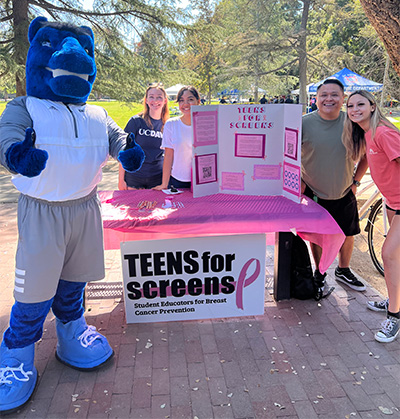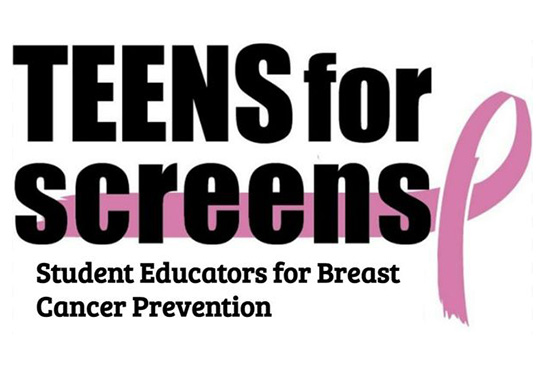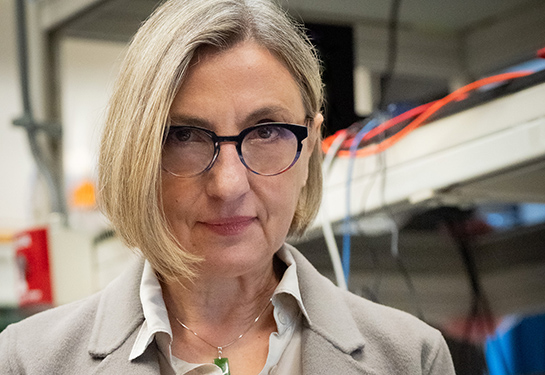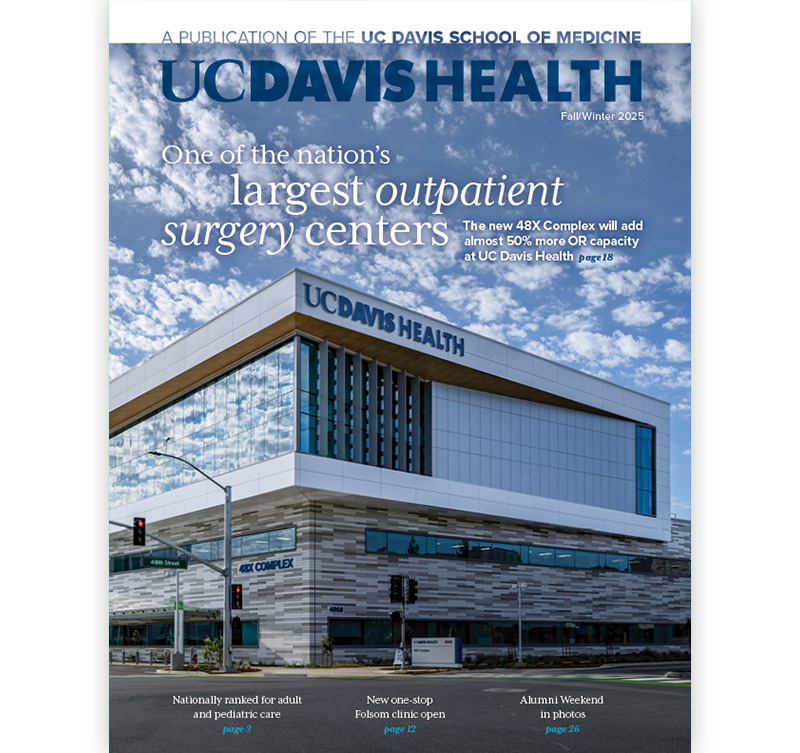Teens for Screens program recruits the next generation of breast cancer educators
UC Davis students team up with cancer center to promote breast cancer screening
It is Breast Cancer Awareness Month and UC Davis Comprehensive Cancer Center is trying a new approach to encourage women in underserved populations to have breast cancer screenings. A program called Teens for Screens encourages young people to educate their families and communities directly.
Teens for Screens was developed in 2018 by the San Francisco Cancer Initiative breast cancer task force. Laura Fejerman, associate director of UC Davis Comprehensive Cancer Center’s Office of Community Outreach and Engagement, helped start the program while she was an associate professor at UC San Francisco. The program was piloted at the high school level, training teen breast cancer educators to take breast cancer awareness messages home to their mothers and other relatives.

Soon after joining UC Davis in 2020, Fejerman helped create a Teens for Screens chapter here.
“We’ve added a new twist to the Teens for Screens program at UC Davis. We now seek to train undergraduate college students as breast cancer educators who, in turn, are educating middle and high school students either in person or remotely,” Fejerman said. “As a part of our efforts, we are partnering with high schools with high populations of underserved groups, such as low-income students and minorities, to provide them with information about breast cancer and the importance of screening.”
Brittany Clary is one of the co-founders and the current president of Teens for Screens at UC Davis. As an undergraduate student, she started the campus club and has been recruiting members, which now number 60. More than 20 have become trained breast cancer health educator mentors.
UC Davis Teens for Screens has already visited three high schools in the Sacramento region. Members meet with students in health and biology classes and attend high school events to recruit teens to become breast cancer educators in their own homes.
“One of the most common experiences we have witnessed is the lack of awareness of breast cancer and the stigmatization of breast cancer,” Clary said. “Many students are not aware of how social determinants affect the risk of breast cancer or the survivability of the disease.”
Like many of her fellow Teens for Screens volunteers, Clary has been personally touched by breast cancer and is passionate about spreading awareness to help save lives.
Clary’s mother is a two-time breast cancer survivor and had a double mastectomy when Clary was in third grade.
“My maternal grandmother was also a survivor of breast cancer as well as bone cancer,” Clary said. “At the time my mother was diagnosed with breast cancer, I didn’t grasp the severity of the diagnosis or the fears my mother felt. She has since told me many times that she was terrified of not returning from surgery and that I would grow up without a mother.”
Both Clary’s mother and grandmother are Indigenous women from Guatemala. She found out about Teens for Screens when she came across the Fejerman Lab while taking a public health class.
“When I realized that Dr. Fejerman’s lab focused on genetic research on breast cancer in Latinas and Indigenous women I felt inspired to get involved,” Clary said.
She believes that many women like her mother may avoid screenings because they fear diagnosis of a disease that could make them unable to care for their families. She knows, however, that screenings can detect breast cancer at early stages, thereby improving the chances of survival.
“A lot of what we do at Teens for Screens is combatting stigmas in place through education and providing informational steps on how to have a healthy conversation about breast cancer. We also give the teens the tools to take their message home and to their neighborhoods,” Clary said.
Along with visual aids to explain how to do breast self-exams, Teens for Screens provides information in English and Spanish about free breast cancer resources, such as California’s Every Woman Counts program that performs screenings and diagnostic services free of charge to underserved women.
Teens for Screens is hoping to expand its education program to include ovarian and cervical cancer material. Clary said that the organization also plans to conduct surveys to determine the need for resources that are culturally tailored for underserved communities.
For more information on the Every Woman Counts program, call 800-511-2300. If you are diagnosed with breast or cervical cancer, free treatment is available to all Californians who qualify through the California Department of Health Care Services’ Breast and Cervical Cancer Treatment Program or call 800-824-0088 for more information.
UC Davis Comprehensive Cancer Center
UC Davis Comprehensive Cancer Center is the only National Cancer Institute-designated center serving the Central Valley and inland Northern California, a region of more than 6 million people. Its specialists provide compassionate, comprehensive care for more than 100,000 adults and children every year and access to more than 200 active clinical trials at any given time. Its innovative research program engages more than 240 scientists at UC Davis who work collaboratively to advance discovery of new tools to diagnose and treat cancer. Patients have access to leading-edge care, including immunotherapy and other targeted treatments. Its Office of Community Outreach and Engagement addresses disparities in cancer outcomes across diverse populations, and the cancer center provides comprehensive education and workforce development programs for the next generation of clinicians and scientists. For more information, visit cancer.ucdavis.edu.






